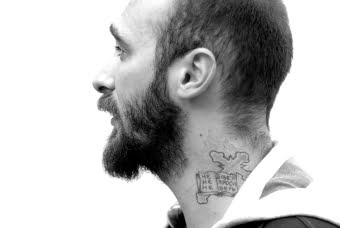
Nicolai Lilin
- Italy, Russia
- Zu Gast beim ilb: 2010
Nicolai Lilin was born in 1980 in Bender, Transnistria (USSR, now part of the Moldavian region). After having fought in the Chechen War during his military service for two years, he moved to Torino in Piedmont in 2003, where he currently lives as author, journalist and tattoo artist (traditional criminal Siberian tattoos).
His first, autobiographical novel »Educazione siberiana« (Engl: »Siberian Education«, 2010) was published in Italy in 2009, and is about his childhood and youth among the Siberian Urkas. Roberto Saviano, author of the investigative novel »Gomorrah«, said of the début: »Whoever wants to read this book must abandon the familiar categories of good and evil… Just do nothing: just read.« The Urkas, as the »honourable criminals« are known, were a Mafia-like clan forcibly relocated from Siberia to the Transnistrian border region by Stalin in the late 1930s. Their lives were governed by their own laws and customs: all weapons are placed in the corner with the icon every evening, tattoos are identifying signs, wealth is scorned, contact with the police is deemed to defile one’s honour, women and the elderly are to be respected, the handicapped are honoured as saints and enjoy protection, and violence is permitted if one has a good reason for it. »Some enjoy life, some suffer it, but for us, it is a battle.« The »Siberian education« the protagonist undergoes in his home town of Bender leads to conflicts with the authorities and other criminal organisations. He gets his first knife at the age of six, becomes accustomed to violence by killing animals, and eventually lands in juvenile prison for the first time at the age of 13 for grievous bodily harm, where he experiences a hell of violence, arbitrariness and misanthropy. Nicolai Lilin’s narrative style is simple and direct, and the reader closely encounters the events of this occasionally grotesque and utterly alien world in a concrete and realistic form. The close-up authenticity results from the lack of a strict composition – the narrator often digresses, wallows in redundancies, or lingers on marginal issues. Lilin also decodes the linguistic codes of the Urkas, who guard their communication with expressive names, a vocabulary straight out of the Old Testament, and their very own terms and phrases. The youth of the Urka ends in Lilin’s »Siberian Education« with a conscription order and his stationing as a soldier in the Russian war in Chechnya. Llilin will deal with his experiences during this war in his next novel, which will continue the story of his life.
Currently translated into 14 languages, »Siberian Education« will also become a film by the italian director Gabriele Salvatores.
Sibirische Erziehung
suhrkamp nova
Berlin, 2010
[Ü: Peter Klöss]
